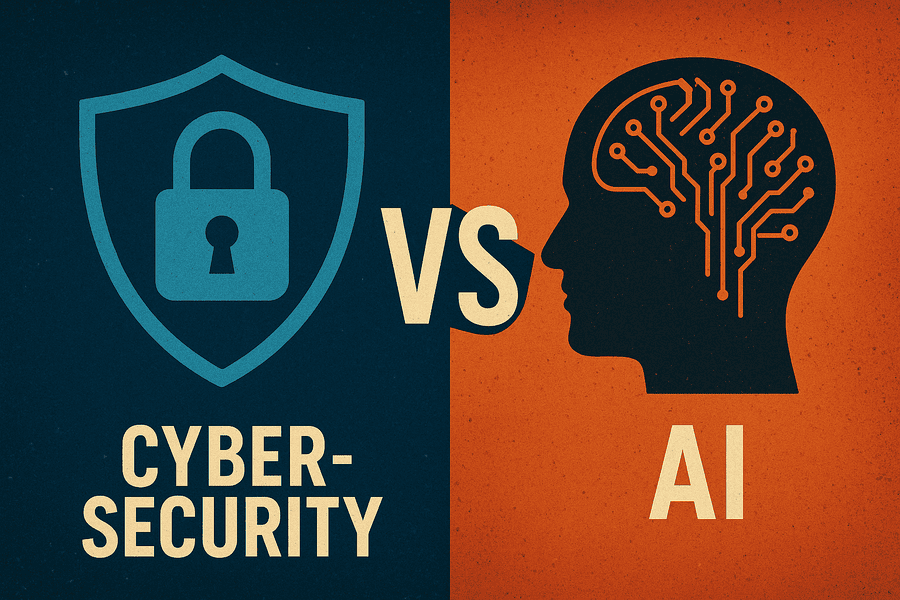
<Graphic showing comparison of cybersecurity and AI>
Which is Easy: Cybersecurity or Artificial Intelligence? A Complete Guide for Beginners

woman torn between cybersecurity and artificial intelligence
Introduction: The Growing Demand for Cybersecurity and AI
In today’s rapidly evolving digital world, two sectors dominate discussions about innovation, opportunity, and security: cybersecurity and artificial intelligence (AI). Whether you’re a student, career changer, or tech enthusiast, you’ve likely wondered: Which is easier to learn, cybersecurity or artificial intelligence? This question is vital for anyone plotting a future in IT or tech, as both fields promise high salaries, job security, and fascinating problems to solve.
The global demand for cybersecurity professionals is at an all-time high due to increasing cyberattacks, data breaches, and regulatory requirements. Meanwhile, AI is reshaping every industry, from healthcare and finance to entertainment and transportation, creating a surge in demand for AI specialists. Both sectors are exciting, rewarding, and offer excellent career growth, but they differ significantly in terms of entry barriers, learning complexity, and required skills.
This comprehensive guide will help you understand the differences, the challenges, and the opportunities in cybersecurity and artificial intelligence careers. By the end, you’ll have a clear answer to which is easier — and which might be right for you.
Understanding the Basics

learning education studying concept
Before comparing the ease of entering and succeeding in cybersecurity or AI, it’s crucial to define what each field encompasses and highlight their foundational differences.
What is Cybersecurity?
Cybersecurity is the practice of defending computers, servers, mobile devices, electronic systems, networks, and data from malicious attacks. This field covers a wide range of activities, including protecting sensitive data, ensuring privacy, preventing unauthorized access, and responding to cyber incidents.
Core areas of cybersecurity include:
- Network security
- Application security
- Information security
- Operational security
- Disaster recovery and business continuity
Cybersecurity professionals range from analysts who monitor for threats to ethical hackers who test system vulnerabilities, to security architects who design robust infrastructures. For more detail, see this beginner’s guide to cybersecurity.
What is Artificial Intelligence?
Artificial Intelligence is the science of creating systems that can perform tasks that typically require human intelligence. These tasks include learning, reasoning, problem-solving, perception, language understanding, and even creativity.
Key domains within AI:
AI specialists develop algorithms, train models, and build systems that can analyze large amounts of data, recognize patterns, and make predictions or decisions. If you’re interested in how AI is built, see why context engineering is redefining how we build AI systems.
Key Differences Between Cybersecurity and AI
|
Aspect |
Cybersecurity | Artificial Intelligence |
| Main Focus | Protection from cyber threats | Building intelligent systems |
| Typical Work | Monitoring, defense, risk management | Algorithm development, data analysis |
| Entry Skill Set | Networking, OS, security concepts | Math, statistics, programming |
| Coding Demand | Moderate (Python, scripting) | High (Python, R, frameworks) |
| Application | IT, finance, healthcare, government | All industries, including cybersecurity |
| Complexity | Practical/Hands-on | Conceptual/Mathematical |
Cybersecurity is primarily about defending and securing systems, while AI is about creating intelligent solutions. The entry points, skills, and learning paths differ greatly, influencing the perceived ease and accessibility of each field. Explore more about types of intelligence in AI and how AI is applied in cybersecurity.
Entry Barriers: Which Path Is Easier to Start?

prisoner in a futuristic cell
One of the most common questions among those considering these fields is: “Which has a lower barrier to entry?” Let’s explore the prerequisites and challenges of getting started in cybersecurity versus artificial intelligence.
Educational Requirements
Cybersecurity:
- Many entry-level cybersecurity roles are accessible with a bachelor’s degree in computer science, information technology, or even without a degree if you have practical skills.
- Industry certifications (e.g., CompTIA Security+, Certified Ethical Hacker) can substitute for formal education and are highly valued.
- Some organizations hire candidates with basic IT skills and provide on-the-job training.
Artificial Intelligence:
- Most AI roles require at least a bachelor’s degree in computer science, mathematics, or a related field, with many positions preferring a master’s or even a PhD.
- Strong background in mathematics (linear algebra, calculus, probability, statistics) is essential.
- Coursework in machine learning, data science, and programming is a must.
Verdict:
Cybersecurity generally has a lower formal education barrier, with certifications and practical skills often sufficient for initial roles. AI typically requires a deeper academic foundation, especially in math and programming.
Learning Curve and Initial Complexity
Cybersecurity:
- Concepts like network protocols, malware, encryption, and firewalls can be grasped with guided study and hands-on labs.
- Many entry-level positions are operational or monitoring-based, with structured workflows.
Artificial Intelligence:
- Involves understanding advanced mathematics, algorithms, and data structures.
- Requires the ability to implement and optimize machine learning models, which can be daunting for beginners.
Verdict:
For most newcomers, cybersecurity is easier to start, requiring less upfront technical and mathematical knowledge.
Availability of Beginner Resources
Cybersecurity:
- Abundant online resources, bootcamps, certifications, and free training platforms.
- Simulated environments and CTF (Capture The Flag) competitions make learning interactive.
Artificial Intelligence:
- Plenty of MOOCs, tutorials, and open datasets, but many are advanced or assume prior programming and math knowledge.
- Real-world projects (like Kaggle competitions) are available but can be overwhelming for complete beginners.
Verdict:
Cybersecurity resources are generally more beginner-friendly, with a smoother on-ramp for those with limited technical backgrounds. For those interested in starting with AI, check out the beginner’s guide on how to learn artificial intelligence using AI resources.
Skills Needed: Cybersecurity vs Artificial Intelligence
What core competencies do you need to succeed in either field? Understanding the skill sets required can help you gauge which path might be easier for you.
Core Skills for Cybersecurity
- Networking Fundamentals: Understanding TCP/IP, DNS, firewalls, and VPNs.
- Operating Systems: Familiarity with Windows, Linux, and Unix security.
- Security Tools: Using SIEM (Security Information and Event Management), IDS/IPS, antivirus, and vulnerability scanners.
- Scripting: Basic scripting in Python, Bash, or PowerShell is helpful but not always mandatory.
- Analytical Thinking: Ability to recognize patterns, assess risks, and respond to threats.
- Attention to Detail: Spotting anomalies, reviewing logs, and following protocols.
Core Skills for Artificial Intelligence
- Mathematics: Comfort with linear algebra, calculus, probability, and statistics.
- Programming: Proficiency in Python (the de facto AI language), R, or Java.
- Algorithms and Data Structures: Deep understanding of how algorithms work and how to optimize them.
- Data Handling: Ability to preprocess, clean, and visualize large datasets.
- Machine Learning Libraries: Familiarity with TensorFlow, PyTorch, Scikit-learn, etc.
- Problem-Solving: Developing and tuning complex models requires creativity and persistence.
Coding Demands: How Much Programming Do You Need?
Cybersecurity:
- Some roles, especially in security operations, require minimal coding.
- Scripting is useful for automating tasks, but deep software development isn’t a must except for specialized roles (e.g., security engineers, penetration testers).
Artificial Intelligence:
- Programming is unavoidable. Implementing models, handling data, and using AI libraries are core parts of the job.
- The ability to write, debug, and optimize code is essential.
Verdict:
If you are uncomfortable with intensive programming and advanced math, cybersecurity is generally the easier path to start with. The Reddit community agrees that AI requires more technical depth early on.
Job Roles and Career Progression

happy man getting promoted on his job
The nature of entry-level roles and the opportunities for advancement can influence how easy it is to begin and thrive in each domain.
Typical Entry-Level Roles in Cybersecurity
- Security Analyst: Monitor and respond to security incidents.
- SOC (Security Operations Center) Technician: Analyze alerts and support incident response teams.
- IT Support with Security Duties: Manage basic security configurations.
- Penetration Tester (Junior): Assist with vulnerability assessments.
These roles are often accessible to those with basic IT skills, foundational knowledge, and certifications. Learn more about cybersecurity career paths.
Typical Entry-Level Roles in Artificial Intelligence
- Data Analyst: Work with data, generate reports, and assist with data cleaning.
- Junior Machine Learning Engineer: Support model training, data preprocessing, and code maintenance.
- AI Research Assistant: Assist in developing and testing algorithms under supervision.
Most entry-level AI jobs still require coding proficiency and a solid grasp of statistics and data handling. See the top AI resources for learning, courses, and online platforms to get started.
Career Growth and Specialization Paths
Cybersecurity:
- Progression can lead to roles like Security Engineer, Ethical Hacker, Security Architect, or Chief Information Security Officer (CISO).
- Specializations include forensics, penetration testing, compliance, and cloud security.
Artificial Intelligence:
- Advancements lead to Machine Learning Engineer, Data Scientist, AI Researcher, or AI Product Manager.
- Specializations include NLP, computer vision, robotics, and deep learning.
Both fields offer rich opportunities for growth, but cybersecurity offers a more accessible ladder for those starting with less technical depth.
Salary, Job Prospects & Industry Demand
Let’s compare the earning potential, job market trends, and future outlook for both career paths.
Current Job Market Trends
Cybersecurity:
- Massive shortage of qualified professionals worldwide.
- Every sector—from government to healthcare to finance—needs cybersecurity staff.
- High job stability due to the ever-present threat of cyberattacks.
Artificial Intelligence:
- Explosive growth, especially in tech, healthcare, automotive, and finance.
- High demand for AI specialists, but fewer entry-level positions compared to cybersecurity.
- Market is competitive and often requires advanced credentials.
Explore a comparative analysis of cybersecurity and AI careers for more insights.
Salary Comparison
- Cybersecurity (US averages): Entry-level: $60,000–$90,000; Mid-career: $100,000–$140,000+
- Artificial Intelligence (US averages): Entry-level: $85,000–$110,000; Mid-career: $120,000–$180,000+
While AI roles often command higher salaries, the entry point is harder, and the competition is steeper. Cybersecurity offers more accessible entry-level roles with strong salary growth potential.
Future Outlook for Both Fields
- Cybersecurity: Demand is expected to outpace supply well into the next decade. New threats, cloud security, and IoT will fuel growth.
- Artificial Intelligence: AI will continue to disrupt industries, but automation may reduce some lower-level jobs, making advanced AI roles even more competitive.
Which Is More Challenging to Master?

man feeling challenged learning
While getting started is one thing, mastering a field is another. Which is more difficult to gain deep expertise in?
Academic and Technical Challenges
Cybersecurity:
- Mastery requires staying updated with new threats, tools, and technologies.
- Deep understanding of system architecture, cryptography, and incident response is needed for advanced roles.
Artificial Intelligence:
- Mastery involves advanced mathematics, research, and continuous innovation.
- Keeping up with rapid changes in AI models, frameworks, and best practices is daunting.
Real-World Application Complexity
- Both fields require hands-on experience and problem-solving skills.
- AI projects often fail due to data issues or algorithmic complexity.
- Cybersecurity incidents can be unpredictable and stressful, requiring quick thinking.
Common Misconceptions
- Cybersecurity is only about hacking: It’s a broad field with many non-hacking roles.
- AI is too abstract for practical work: AI has many practical roles, especially in data analysis and automation.
How to Decide: Which Path Is Right for You?
Ultimately, the “easier” path depends on your background, interests, and goals.
Personality and Interest Fit
- Cybersecurity: Suits those who enjoy problem-solving, attention to detail, and defending against real-world threats.
- Artificial Intelligence: Ideal for those passionate about math, algorithms, and building intelligent systems.
Learning Style and Motivation
- Cybersecurity: Appeals to hands-on learners who like practical labs, simulations, and direct application.
- Artificial Intelligence: Attracts those who enjoy theoretical learning, research, and experimentation.
Transferable Skills and Switching Between Fields
- Many cybersecurity professionals use AI tools, and AI specialists work on security projects.
- Skills in programming, data analysis, and systems thinking are valuable in both fields.
- It’s possible to start in cybersecurity and pivot to AI (or vice versa) as your skills grow. Can you work in AI with a cybersecurity degree?
Frequently Asked Questions
Q1: Is cybersecurity easier to learn than artificial intelligence?
A: For most beginners, cybersecurity is easier to start, with more accessible roles and fewer advanced academic prerequisites.
Q2: Can I transition from cybersecurity to AI or vice versa?
A: Yes, especially if you build strong programming and analytical skills. Many concepts overlap, especially in areas like security analytics or AI-powered threat detection.
Q3: Do I need a degree for either field?
A: A degree is helpful but not always required for cybersecurity (certifications matter), while most AI roles require at least a bachelor’s in a technical field.
Q4: Which field has better long-term prospects?
A: Both fields are growing, but cybersecurity has a wider range of accessible entry-level roles; AI offers higher salaries at the cost of a steeper learning curve.
Q5: What if I’m not good at math or programming?
A: Cybersecurity is more forgiving for those without deep math or coding skills, though some programming is still useful.
Conclusion: Cybersecurity or Artificial Intelligence — Which Is Easier?
So, which is easy: cybersecurity or artificial intelligence?
- Cybersecurity is generally easier to enter, with lower academic barriers, more beginner-friendly resources, and a wide variety of roles for those with basic IT skills. The learning curve is smoother, especially for those with little programming or mathematical expertise.
- Artificial Intelligence is more challenging at the outset, requiring strong foundations in mathematics and coding. While the salaries and potential impact are significant, the path is steeper and more competitive from day one.
Final Recommendation:
If you’re looking for a faster career start, practical learning, and a wide range of job opportunities, cybersecurity is likely the easier path. If you’re passionate about advanced mathematics, algorithms, and building the future of technology—and are ready to tackle a challenging but rewarding field—artificial intelligence could be your calling.
Both fields are essential, in-demand, and offer dynamic, future-proof careers. The best choice depends on your background, interests, and commitment to learning.
Curious about both cybersecurity and artificial intelligence? Get a feel for how AI works in action—test-drive powerful AI chatbots or experiment with cutting-edge AI art generators. These tools offer a practical way to explore what’s possible, whether the goal is smart automation or creative expression.




